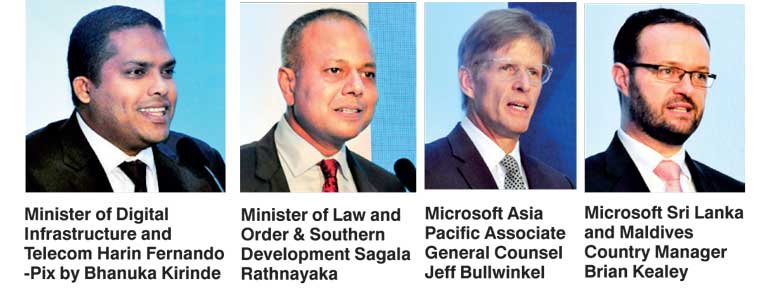Sunday Feb 15, 2026
Sunday Feb 15, 2026
Monday, 16 May 2016 01:30 - - {{hitsCtrl.values.hits}}

By Devin Jayasundera
The Microsoft Corporation partnering with the Ministry of Telecommunication and Digital Infrastructure announced its first steps towards a fully digitised public sector, under the theme of “Transforming to a Digital Government.”
This process of government digitisation will be initially implemented in three different areas; the parliament, education and the small and medium enterprises sector.
Microsoft will continue its longstanding partnership with the government in assisting the public sector to grasp the full potential of future-driven technology components such as Internet of Things (IoT), big data and cloud computing. The Government is positively looking at empowering key public sectors including education, healthcare, urban development and finance with the use of technology.
“The digitisation imperative is an unavoidable reality that all governments and private institutions will need to face in the new industrial revolution” claimed Microsoft Country Manager for Sri Lanka and Maldives, Brian Kealey. The emergence of the Internet of Things (IOT) has generated a huge influx of data via machines to machine communications from networks and sensory devices. Kealey believes this information would enable governments to make better decisions through techniques such as big data analytics.
In highlighting the current status of the country’s public digital platforms Minster of Telecommunication and Digital Infrastructure Harin Fernando stressed the need of a conceptual and infrastructural upgrade in public access to information technology. He professed that the current computer centres which are widely spread in schools and temples around the country are outdated and insufficient to deliver the expected outcomes in creating a digitally inclusive society. He added that in catering to modern demands the government is planning to set up “innovation centres” which will act as incubators and support groups for entrepreneurs to conduct their ventures.
The Minster also briefed his preliminary plans to introduce tablet based education to schools. “We are hoping to conduct a pilot study in selected schools, to assess the effect on the productivity level of students in using tablets as a substitute for textbooks”.
Minster of Law and Order Sagala Ratnayake referring to his visit to the Microsoft Headquarters in Redmond in Washington, stated that he was able to experience how students perform better when technology is used in classrooms in contrast to the classrooms that don’t.
Microsoft Asia Pacific and Japan, Associate General Counsel Jeff Bullwinkel speaking at the event observed that mobile, social media, analytics and cloud as the four megatrends that are driving today’s technology. He emphasised that these trends are instrumental for governments in lowering operational costs, helping to make data driven decisions and instilling transparent platforms for good governance.
According to a McKinsey study the biggest challenge in government digitisation projects are the lack of individuals in the public sector with the required expertise in technology. Minister Fernando stated that as a short term solution in the next six months, 10,000 individuals who are qualified in IT will be recruited to build a cyber-cadre. He also added that there is a plan to provide them training abroad with the help of companies such as Infosys and Huawei.